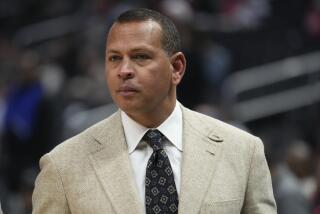Conte’s cost move imperils Bonds’ case
- Share via
By saving $150, Victor Conte may have also saved Barry Bonds from prison.
Today in San Francisco, U.S. District Judge Susan Illston has summoned Greg Anderson, Bonds’ former personal trainer, to answer whether he will testify in the home run king’s perjury trial that starts next week.
Conte, founder of the Bay Area Laboratory Co-Operative that distributed steroids to a slew of elite athletes, was discussing the importance of today’s pretrial hearing when Conte reflected on the circumstances that made this such a pivotal court appearance.
Last week, Illston indicated she would probably exclude from the trial three positive steroid tests that prosecutors say belong to Bonds unless there is a direct link showing the samples came from the former San Francisco Giants slugger.
Anderson’s attorney has already said his client will not testify. Federal prosecutors have told Illston they want to move immediately on a contempt claim if Anderson remains silent and imprison the trainer throughout the trial.
But without Anderson’s testimony on the three drug test results, Illston wrote that she would toss out that evidence from trial.
“Under these circumstances, this is not a case in which the chain of custody has a few ‘rusty’ links,” Illston wrote. “Rather, crucial pieces of the chain are missing altogether.”
Conte told The Times on Thursday the suspect chain of custody in Bonds’ drug samples was the result of a decision Conte made in early 2000 to save money. A representative of Quest Diagnostics informed him that because Conte was submitting dozens of drug testing samples for “research,” and not a clinical or forensic reason, he could get a $50-per-sample discount if he agreed to waive chain-of-custody protocol.
“I’m thinking as I’m sending in hundreds of samples, ‘Let’s do the math,’ ” Conte said. “Of course I wanted it quick and dirty, no frills.”
Conte acknowledged the testing was done to ensure his designer steroids, “the cream” and “the clear,” remained undetectable to anti-doping authorities.
Bonds tested positive in 2004 for steroids, according to court records, but he told a federal grand jury in December 2003 he did not knowingly take performance-enhancing drugs. Bonds said he believed he was using flaxseed oil and an arthritic balm. Prosecutors allege that Bonds was lying when he denied using performance-enhancing drugs.
Instead of following a strict chain-of-custody system that documented every step in a urine sample’s gathering and testing, BALCO only submitted a sample with a number code to Quest. No one watched the athlete urinate in a cup, no one noted how that sample was handled before it reached Quest.
Conte estimated he saved more than $15,000 overall in the Quest discounts, then realized as federal investigators circled him before raiding BALCO in September 2003 that the discount plan would have the legal impact of creating reasonable doubt beneficial to BALCO-connected defendants.
“I knew there were going to be consequences to what I was doing a long time before they [federal investigators] walked through my door,” Conte said. “Did I know then that someday this lack of a paper trail would serve me? Yeah, I knew.”
A spokesman for the U.S. attorney’s office in San Francisco declined to comment on the Bonds case, and Quest officials were not immediately available for comment.
--
More to Read
Go beyond the scoreboard
Get the latest on L.A.'s teams in the daily Sports Report newsletter.
You may occasionally receive promotional content from the Los Angeles Times.











